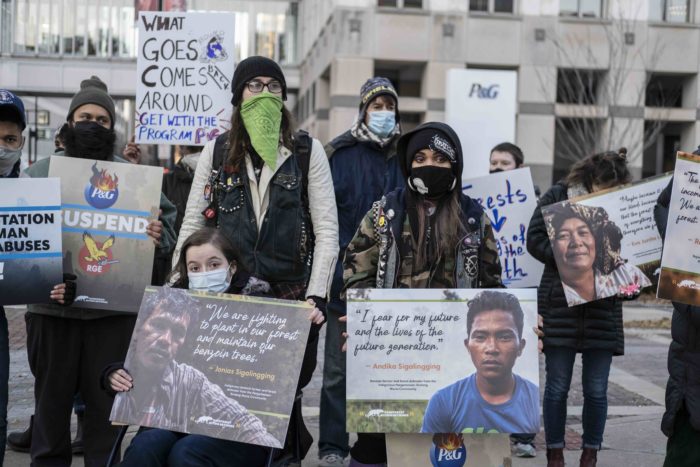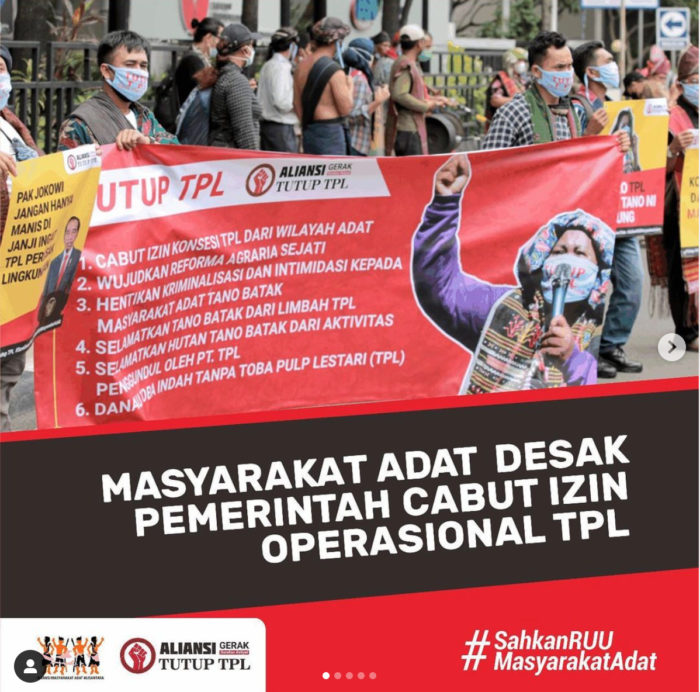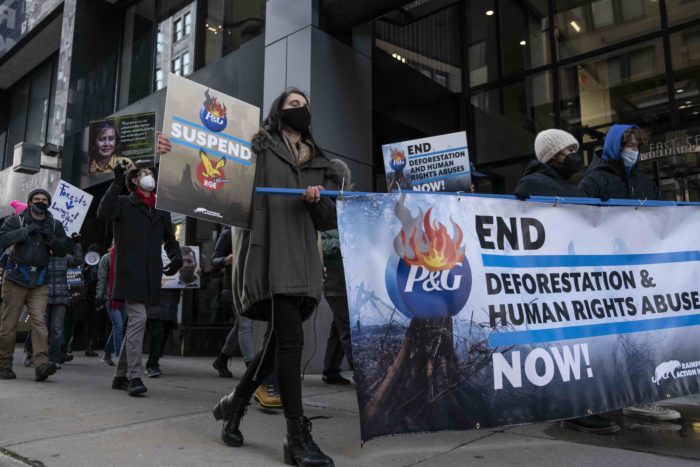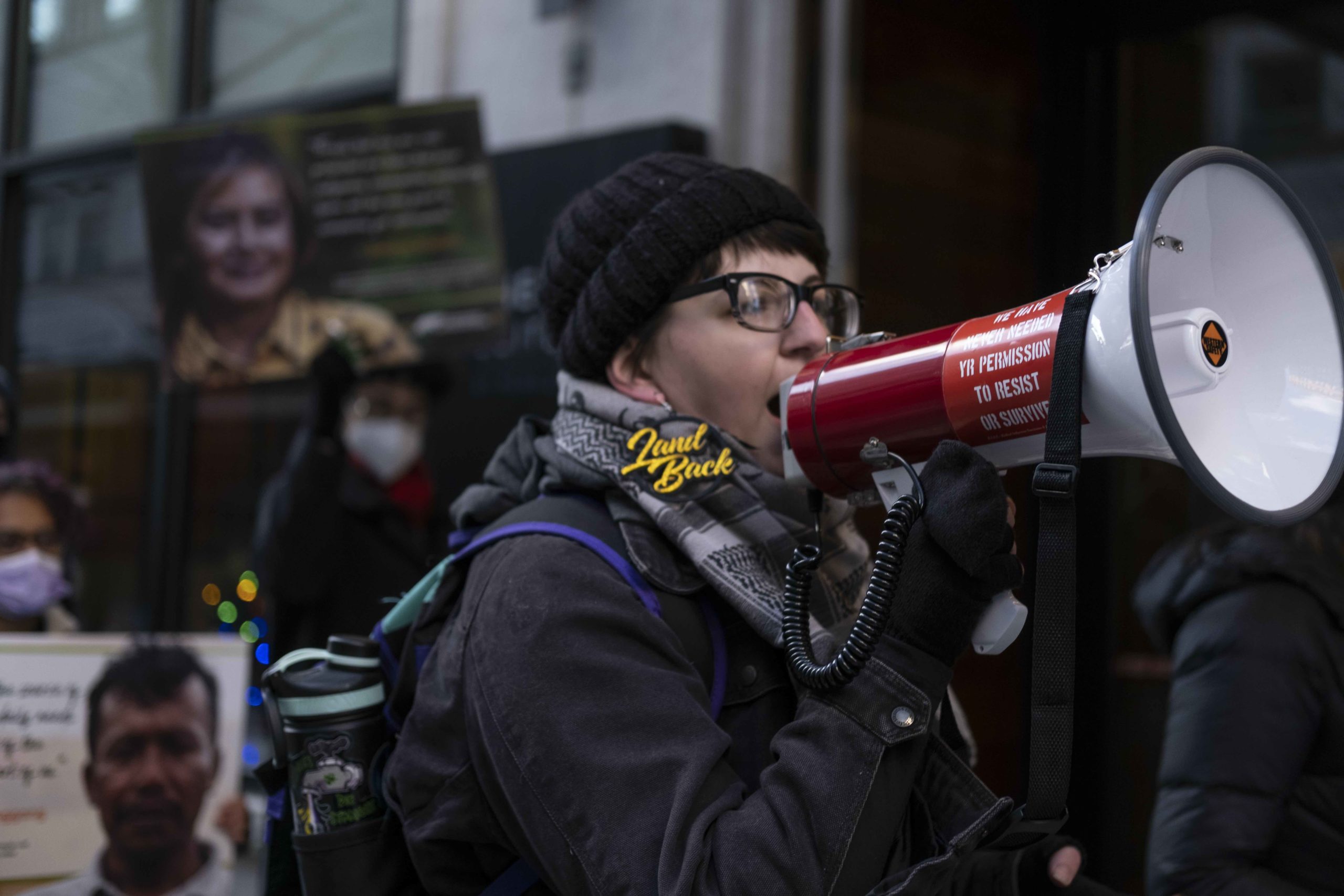Untuk Bahasa Indonesia klik disini
This Wednesday, RAN and partners gathered in front of Cincinnati City Hall to deliver over 100,000 signatures from across the U.S. and the world demanding Procter & Gamble end rainforest destruction and human rights abuses. Procter & Gamble is one of the world’s biggest consumer brands and its palm oil supply chain and business partnerships are harming Indigenous communities from the Boreal Forests of Canada to the expanding palm and pulp plantations in Indonesia.

This action happened also in solidarity with the over 40 Indigenous representatives from Tano Batak, North Sumatra, that came to the capital city of Jakarta to collect the Indonesian President Joko Widodo’s promise, made in August, to resolve the land conflict on Indigenous Tano Batak lands and customary forests. Indigenous representatives came back to Jakarta to pressure the Indonesian government to shutdown TPL and recognize Indigenous lands and rights last week. Members from the Pargamanan-Bintang Maria community, whose fight for their right to their lands we’ve amplified and portrayed in the past weeks, were part of the week-long protest.
Indigenous activists facing police repressions and arrests
During one of the actions, 21 Indigenous representatives were arrested while protesting in front of the Ministry of Environment and Forestry, one Indigenous member named Maruli Simanjuntak was beaten as the police put him in a police car. Thanks to public pressure, they were released after being detained for five hours. This latest incident adds to an already long-list of nearly 100 documented cases of violence and criminalization against Indigenous Batak communities who have been fighting to get their land back from pulp company PT. Toba Pulp Lestari (TPL).

The Indigenous delegation also staged protests at the Presidential Palace, the Coordinating Ministry of Maritime and Investment Affairs, as well as the Indonesian Human Rights Commission. The protests are a continuation of a growing movement under the banner of Aliansi Gerak Tutup TPL (Movement Alliance to Shutdown TPL) calling for the revocation of PT. TPL’s license on Indigenous Tano Batak lands. This alliance of twenty-three Tano Batak communities and NGOs have been mounting protests since May 2021 in response to the violent attack by the company against one of the Indigenous communities in Natumingka village.
2021- A Year of Indigenous Uprising in Lake Toba
In August, a small group of Batak activists embarked on a month-long foot march to meet Indonesian President Jokowi resulting in commitments to grant customary forests to Indigenous communities. Not stopping there, communities also staged powerful protests in five districts where the company concessions have swallowed Indigenous lands all through September and October.
In October 2021, a government-led verification team went to visit Batak lands in an effort to resolve the conflict and confirm 18 of the 23 customary forests on Indigenous communities’ lands. But according to local grassroot group KSPPM, the effort was undermined by PT. TPL who tried to cancel and heavily influence the outcome of the process. The scope of the verification was also seen as discriminatory as it exempted communities like Pargamanan-Bintang Maria whose lands are home to over 1,763 hectares of forests that are critical to keeping a stable climate.

So, who is essentially responsible for these human rights violations?
Driving the destructive expansion of big agribusinesses like TPL is the demand for more and cheaper commodities from international brands. Brands like Procter & Gamble are complicit in destroying Indigenous lives and forests. Indigenous communities are calling for solidarity action.
That’s why RAN stands in solidarity with the Tano Batak Peoples and the Pargamanan-Bintang Maria community – and every Indigenous People fighting for their basic rights. We will keep on upping the pressure on Procter & Gamble and other U.S. consumer brands and demand an end to their involvement in rainforest destruction and Indigenous land grabs. Only changing policies and practices of major public-facing companies will help make a systemic shift towards a more sustainable way of production happen.
If you’d like to help amplify the voices on the ground, RAN and partners have prepared some content that can be shared widely across all social channels!












